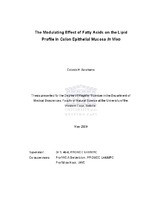The modulating effect of fatty acids on the lipid profile in colon epithelial mucosa in Vivo
Abstract
Several abnormal conditions, including some cancers, have been associated with changes in the membrane lipid and FA composition. Dietary fat serves as a major source of lipids and FA, particularly the polyunsaturated fatty acids (PUFA), n-6 and n-3. High intakes of n-6 PUFA have been linked to the development of colon cancer in association with low n-3 PUFA intake. Therefore understanding the differences in the lipid and FA profiles between cancer and normal cells in the colon, and the role diet plays in these factors may be invaluable in understanding their role in carcinogenesis. This study compares the lipid profile of azoxymethane (AOM) induced colon polyps to that of the surrounding mucosa tissue in rats fed a diet high in n-6 PUFA. Male Fischer rats were fed the AIN-76A diet containing sunflower oil that has high n-6 PUFA content for a period of nine months. Results indicate that the lipid and FA content of the colon polyps differs significantly from the surrounding mucosa. Colon polyps had an increase in membrane phopholipids phosphatidylcholine (PC) and phosphatidylethanolamine (PE). Changes in membrane fluidity were indicated by the decrease (0.05) in the PC/PE and cholesterol/phospholipids (chol/PL) ratios, and increase (0.05) in the polyunsaturated FA/saturated FA (P/S) ratio. Metabolism of FA was significantly altered in the polyps favouring n-6 FA metabolism and the production of prostaglandin E2. No clear indication of impaired & Delta;6-desauturase enzyme activity was noticed. Increases in the n-6 PUFA content could be a reflection of the dietary FA intake that increases FA incorporation in the polyps. Changes in the FA parameters of the polyps, particularly an increase in C20:4n-6 and the n6/n3 ratio have been shown to contribute to the rapid growth of cancer tissue. These lipid changes associated with the development of colon polyps could provide unique targets for developing strategies in chemoprevention by dietary manipulation.

